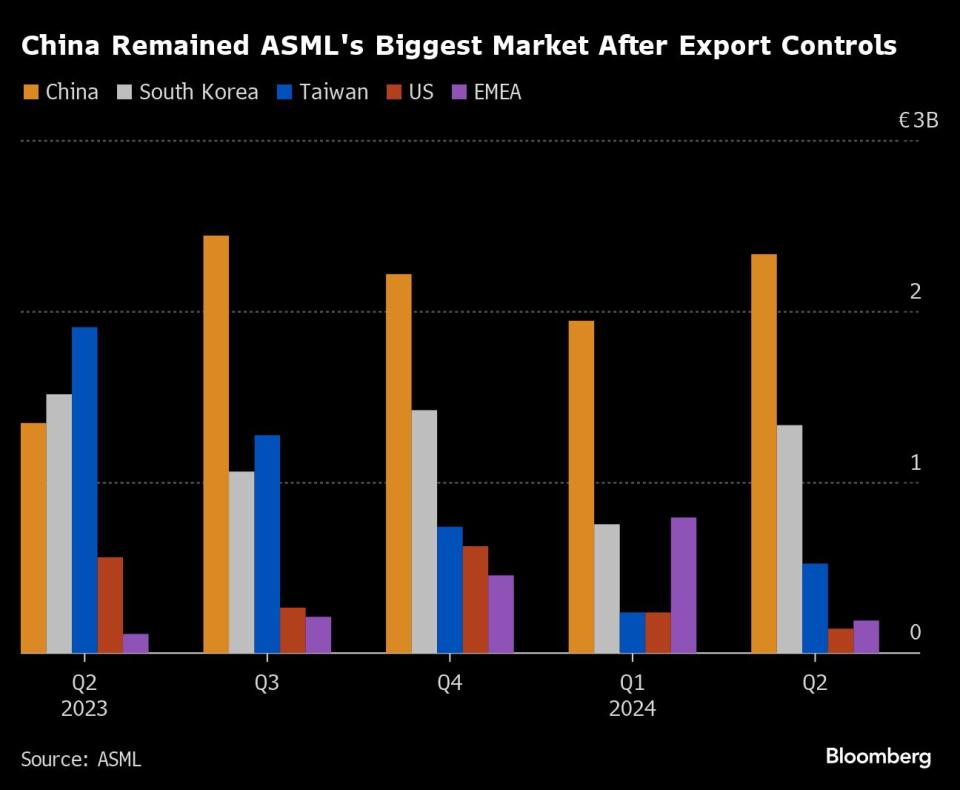ASML Falls as Outlook Clouded by Risk of US Export Curbs

(Bloomberg) -- ASML Holding NV fell as the prospect of more severe US restrictions on its business in China offset growth in the Dutch firm’s order intake last quarter.
Most Read from Bloomberg
Harris Wins Soros Backing While Other Billionaire Donors Want an Open Contest
Trump Risks Getting Tables Turned on Him With New 2024 Adversary
Joe Biden Bows to Democrats Who Wanted Him Out, Upending US Politics
The Money Mess Biden Is Leaving for Fellow Democrats: QuickTake
The Biden administration is considering using the most severe trade restrictions available if companies including ASML continue to give China access to advanced semiconductor technology, Bloomberg News reported on Wednesday before the company published its second quarter results.
The US is targeting ASML, which has a monopoly on making the machines that produce the most advanced semiconductors, as it ratchets up pressure to stem Chinese advances in the semiconductor industry. Shares fell even as the company reported that bookings rose 54% in the second quarter from the previous three months to €5.57 billion ($6.1 billion), beating estimates.
“The geopolitical angle, however, is likely to be in more focus today than results, with Bloomberg reporting the US is pressing for additional restrictions on ASML,” Citi analyst Andrew Gardiner said in a note. “Pressure is building to restrict service activity on the installed base.”
ASML shares plunged 11% in Amsterdam on Wednesday to €870.90 after the Bloomberg report, wiping out €42.7 billion ($46.7 billion) of market value. That was the biggest decline since March 2020.
ASML sees sales in the current quarter between €6.7 billion and €7.3 billion, missing estimates of €7.5 billion. The company confirmed previous guidance of flat sales this year before returning to strong growth in 2025.
Previous US-led chip measures targeting ASML’s exports to China did not dent demand from the Asian nation. China accounted for nearly half of ASML’s revenue in the second quarter, and sales in the country rose by 21% from the previous period. Beijing has been buying up unrestricted older kit to make more mature types of semiconductors.
ASML is increasingly driven by demand for high-powered chips needed for AI applications.
“We currently see strong developments in AI, driving most of the industry recovery and growth, ahead of other market segments,” Chief Executive Officer Christophe Fouquet said in the statement.
Impressive results from some of ASML’s biggest customers helped support demand for the company’s equipment. Last week, Taiwan Semiconductor Manufacturing Co. said second-quarter sales grew at their fastest pace since 2022, buoyed by the AI boom that’s fueling data center investment worldwide. Sales to Taiwan rose by €290 million in the quarter as demand for advanced equipment also inched up.
Last quarter was ASML’s first under Fouquet, who took over when Peter Wennink retired in April. He has been trying to balance a US push to tighten export controls for China with the need to continue to sell gear in the company’s biggest market.
US pressure to slow Beijing’s advances in making semiconductors led the Netherlands to ban exports to China of ASML’s second-most advanced category of machinery, immersion DUV lithography machines, at the start of the year.
However, ASML continues to service machines that were bought before the restrictions were in place. The Biden administration has told allies that it’s considering using the foreign direct product rule, which lets the US impose controls on foreign-made products that use even the tiniest amount of American technology, if such practices continue, according to the Bloomberg report.
The company has said as much as 15% of China sales this year will be affected by the export control rules imposed in January. ASML has never been allowed to sell its most-advanced extreme ultraviolet technology to China.
(Updates with shares)
Most Read from Bloomberg Businessweek
The $12,000 Harvard Class Celebrities Are Fighting to Get Into
The Zombie Mall King Doesn’t Want to Be a Bottom-Feeder Forever
Why the Nobel-Laureate Pioneer of Microfinance Risks Life in Jail
©2024 Bloomberg L.P.
